AMD's 7nm Ryzen 3000 CPUs, Radeon RX 5700 GPUs: 5 Things To Know
AMD reveals at Computex in Taiwan that its 7-nanometer Ryzen 3000 desktop processors and Radeon RX 5700 graphics cards are launching in July, revving up the competition against Intel as it launches new products in the desktop and laptop markets.
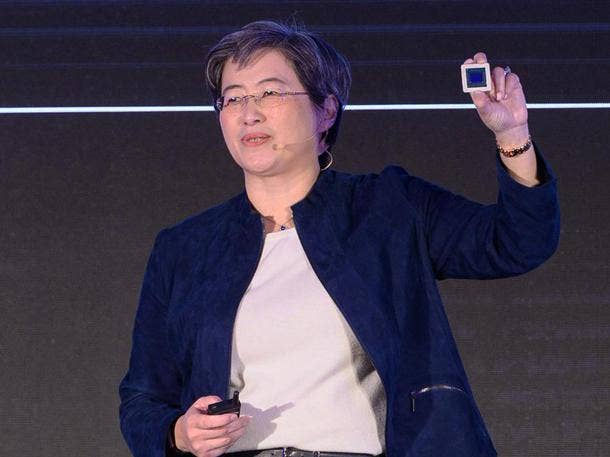
Ryzen 3000 CPUs, Radeon RX 5700 GPUs Coming Soon
After months of anticipation, AMD revealed more details, including release dates, for its third-generation, 7-nanometer Ryzen desktop processors, as well as its next line of 7nm Radeon graphics cards at the Computex trade show in Taiwan.
The Santa Clara, Calif.-based company first revealed its third-generation Ryzen desktop processors at CES in January, promising competitive performance against Intel's flagship gaming CPU, the ninth-generation Core i9-9900K (which Intel has since upgraded with a faster version).
[Related: AMD: 7nm Ryzen's CES Debut Just The Start Of New Fight Against Intel]
In the company's most recent earnings, Lisa Su, AMD's CEO, said that first-quarter sales for Ryzen client processors more than doubled from the same period last year, helping the company grow its market share against Intel for the sixth consecutive quarter. AMD launched the Ryzen client processor brand in 2017 to take on Intel's lineup of Core client processors.
2019 is a big year for AMD and Intel, the latter of which continues to dominate the PC market, with both companies planning to release new products based on next-generation manufacturing processes. While AMD's Computex news is largely focused on its forthcoming Ryzen 3000 series processors and its Radeon RX 5700 series GPUs, Intel is making a big push with its 10th-generation Core mobile processors.
What follows is the most important details from AMD's announcements for its third-generation Ryzen processors and Radeon RX 5700 graphics cards, as well as new disclosures around its Zen 2 processor architecture, a new GPU architecture called RDNA and its upcoming EPYC server update.
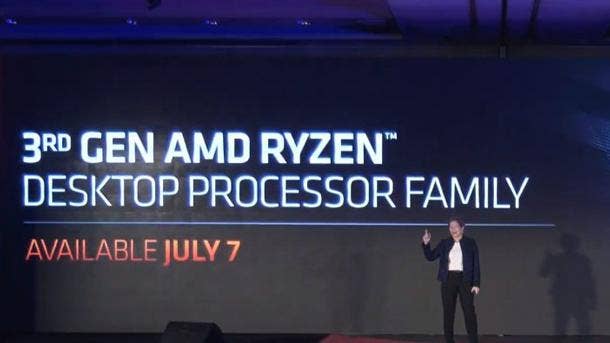
5. 3rd-Gen Ryzen Runs Up to 12 Cores For $499
After teasing at CES that its third-generation Ryzen processors would feature up to eight cores and 16 threads, AMD surprised Computex with news that its top-of-the-line SKU in the new processor, the Ryzen 9 3900X, would feature up to 12 cores and 24 threads at a suggested retail price of $499.
The Ryzen 9 3900X, a new addition to AMD's client portfolio, will come out on July 7 alongside four other processors in the new family: the Ryzen 7 3800X (eight cores, 16 threads, 4.5 GHz boost frequency), the Ryzen 7 3700X (eight cores, 16 threads, 4.4 GHz boost frequency), the Ryzen 5 3600X (six cores, 12 threads, 4.4 GHz boost frequency), and the Ryzen 5 3600 (six cores, 12 threads, 4.2 GHz).
While the Ryzen 9 3900X tops Intel's competing Core i9-9900K on core count, it only sports a boost frequency of 4.6 GHz and a base frequency of 3.8 GHz, below the 5.0 GHz boost frequency and 4.0 GHz frequency of Intel's Core i9-9900K, which comes with eight cores for $488. (Intel announced a new version of the i9, the i9-9900KS, which runs up to 5 GHz on all cores).
The Ryzen 9 3900X's total memory cache is 70 MB while the Ryzen 5 3600 is half that.
AMD said one of the core features of the Ryzen 3000 desktop series is its support for PCIE 4.0 connectivity, which is being introduced in a new X570 chipset that is launching in more than 50 new motherboards from ASRock, Asus, Gigabyte and MSI. The company said PCIe 4.0 supports 42 percent faster storage performance than PCIe 3.0 devices, enables high-performance graphics cards and NVMe drives and doubles the motherboard bandwidth.
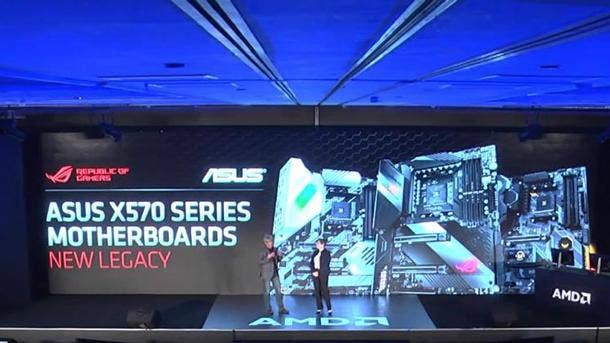
4. 3rd-Gen Ryzen Performance, OEM Support
During AMD CEO Lisa Su's keynote at Computex, she provided a few demonstrations of how the new third-generation Ryzen desktop processors compare to Intel's Core processors.
When comparing AMD's Ryzen 9 3900X, which costs $499, to Intel's professional-grade Core i9-9920X, which also packs 12 cores and costs up to $1,119, the former was found to be 16 percent faster using the rendering engine in the popular 3D graphics tool Blender.
As for Intel's top consumer processor, the Core i9-9900K, which costs $488, AMD said it could provide similar performance with its Ryzen 7 3800X, which costs $399.
Lastly, when comparing AMD's Ryzen 3700X, which costs $329, to Intel's Core i7-9700K, which costs at least $374, the former outperformed in single-threaded tasks by 1 percent and multi-threaded tasks by 30 percent for real-time rendering applications.
As for OEM and system integrator support, AMD said new desktop systems from Acer, Asus, CyberPowerPC, HP, Lenovo and Maingear will be coming out in the coming months.
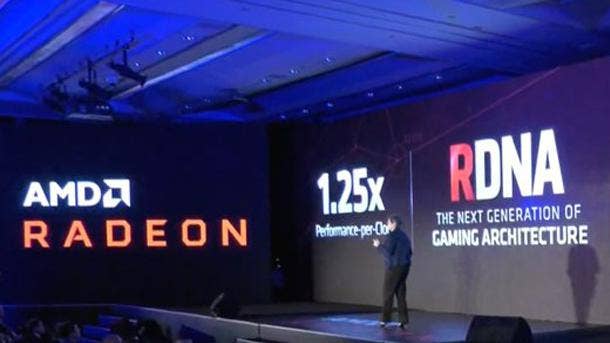
3. AMD Sheds First Details On Radeon RX 5700
AMD debuted its first 7-nanometer GPU, the Radeon Instinct MI60 for data centers, last fall, and followed that up with the first 7nm desktop graphics card, the Radeon VII, earlier this year.
Now the company is preparing to launch a wider selection of 7nm graphics cards for desktop systems in July with the new Radeon RX 5700 series, which will feature GDDR6 memory and PCIe 4.0 support. In a demonstration, AMD CEO Lisa Su showed a Radeon RX 5700 graphics card outperforming Nvidia's GeForce RTX 2070 in the PC game Strange Brigade at roughly 100 frames per second at high settings.
AMD said the forthcoming GPU product line is based on RDNA, which it called "the next foundational gaming architecture" that will drive the future of gaming across PCs, consoles and cloud. The new design will allow the company to provide improvements in performance, power and memory efficiency in a smaller package compared to its previous generation Graphics Core Next architecture.
Those improvements include a higher performance-per-clock of more than a factor of 1.25 and a higher performance-per-watt of more than 1.5 times compared to the previous architecture, which AMD said will enable a "better gaming performance at lower power and reduced latency."
AMD said it will share more RX 5700 details at a June 10 event during the E3 video game convention.
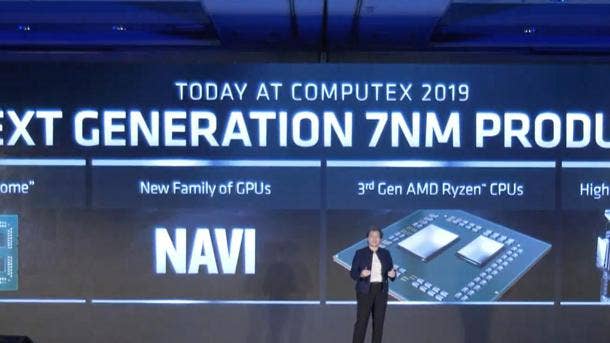
2. AMD Provides Updates On 7nm EPYC CPUs
Outside of announcements focusing on processors and GPUs for the client PC markets, AMD delivered new disclosures around its family of EPYC processors for the data center.
First, AMD CEO Lisa Su performed a test comparing the upcoming 7-nanometer, second-generation EPYC processor (code-named "Rome") to Intel's Xeon Platinum 8280, a 28-core CPU that is part of the second-generation Xeon Scalable family. Using the NAMD Apo1 v2.12 benchmark test, AMD demonstrated that the EPYC CPU outperformed the Xeon CPU by more than a factor of two.
The company then brought Microsoft on stage to reveal that its Azure cloud service achieved a new level of performance in computational fluid dynamics that was previously unobtainable using its Azure HB cloud instance that runs on AMD's first-generation EPYC processors.
“HB-series VMs on Azure are a game changer for HPC in the cloud. For the first time, HPC customers can scale their MPI workloads to tens of thousands of cores with the agility of the cloud and performance and economics that rival on-premise cluster," Navneet Joneja, head of product for Azure Virtual Machines at Microsoft, said in a statement.
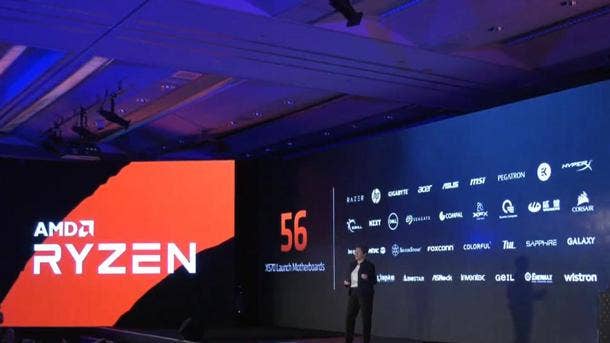
1. New Disclosure For Zen 2, The New Architecture Behind Ryzen 3000
The underlying architecture for AMD's forthcoming Ryzen 3000 desktop processors and EPYC "Rome" server processors is called Zen 2, which the company first revealed last fall.
In an update at Computex, the company said Zen 2 will provide an estimated improvement in instructions per clock by up to 15 percent over the previous generation Zen architecture, which powers second-generation Ryzen processors and first-generation EPYC processors that are currently available.
AMD said the Zen 2 core features "significant design improvements, including larger cache sizes and a redesigned floating-point engine."